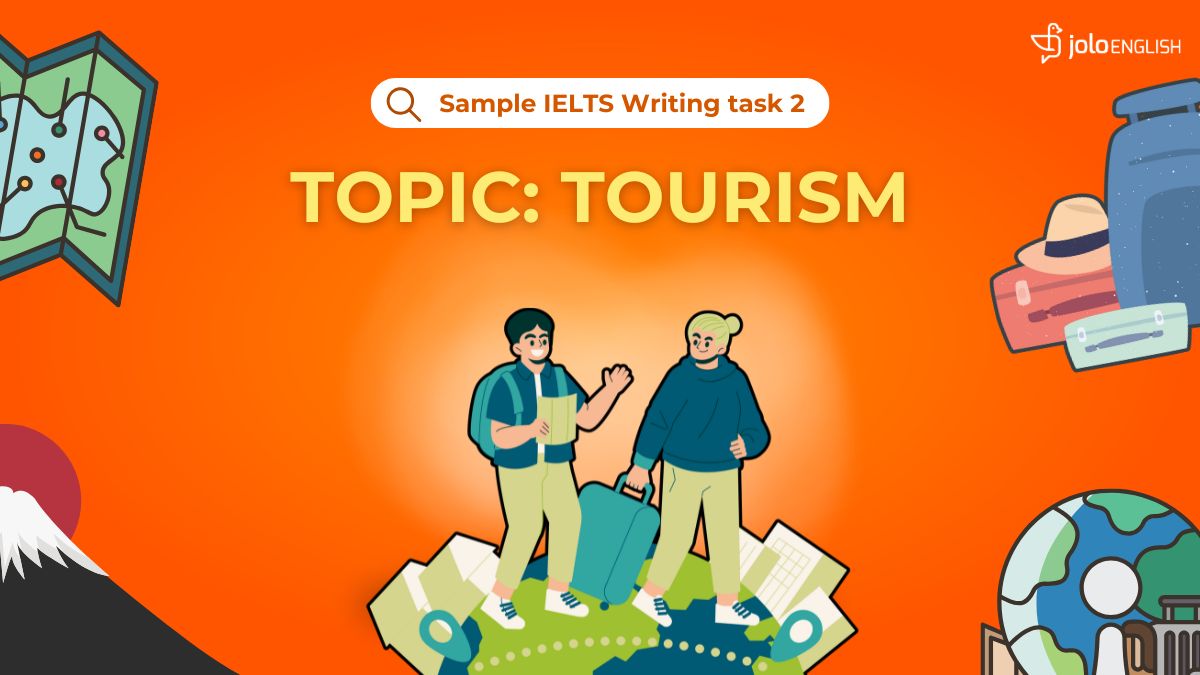Chủ đề du lịch (tourism) trong bài thi IELTS Writing Task 2 là một trong những chủ đề phổ biến và nhận được sự quan tâm rất lớn từ các thí sinh. Việc nắm vững các luận điểm và cách triển khai ý tưởng hợp lý khi viết về du lịch sẽ giúp bạn có được điểm số cao trong bài thi IELTS.
Hôm nay, JOLO sẽ chia sẻ tới bạn một bài mẫu IELTS Writing Task 2 với chủ đề du lịch, giúp bạn hiểu rõ hơn về cách tổ chức bài viết, phát triển luận điểm và sử dụng từ vựng chính xác. Mỗi luận điểm trong bài mẫu này không chỉ giúp bạn thể hiện quan điểm cá nhân mà còn chứng minh được khả năng tư duy logic, mạch lạc của bạn, điều này rất quan trọng trong phần thi này.

Đề bài
Organizing tours to remote places and communities is becoming more and more popular. Is it a positive or negative development for the local people and environment?
Dàn ý
trình bày quan điểm qua 1 đoạn mở bài (introduction), 2 đoạn thân bài (body paragraph), và 1 đoạn kết bài (conclusion).
Mở bài: Sau khi paraphrase lại đề bài, sẽ đưa ra một Thesis Statement (luận điểm) để nêu quan điểm.
- Body 1: phân tích tác động tiêu cực của du lịch vùng sâu, vùng xa. Sau đó, DOL đưa ra giải pháp phản biện (Antithesis) để hỗ trợ quan điểm của mình ở Body 2.
- Body 2: chứng minh phát triển du lịch ở các vùng này có tác động tích cực đến chất lượng sống người dân địa phương.
Negative impacts on the environment and communities
- >> Reason 1: increased tourism demands more infrastructure >> lead to the habitats destruction.
- >> Reason 2: tourist behaviors (littering, pollution) harm fragile ecosystems.
Antithesis: government policies
- >> Example: limiting visitors & promoting eco-friendly accommodations.
Body paragraph 2:
Improve the quality of life for local communities
- >> Explain: tourism transforms traditional industries into new opportunities in hospitality, transportation and crafts.
- >> Example: the North Pole - shift from hunting and fishing to tourism.
- >> Effect: diversified income & improve standard of living.
Bài mẫu
In recent years, there has been a notable surge in tourism to far-flung and isolated destinations. While this trend may come with some negative impacts, I believe that the benefits it offers outweigh the drawbacks.
On the one hand, the expansion of tourism in remote regions can present significant risks to both the local environment and the communities themselves, especially when development is poorly regulated. From an environmental standpoint, an influx of tourists often leads to the construction of infrastructure like hotels, roads, and transportation networks, which can damage natural habitats and landscapes. Furthermore, many visitors may not fully understand the environmental consequences of their actions, leading to issues such as littering and pollution, which can further harm vulnerable ecosystems. However, these negative effects can be mitigated with the right governmental measures and policies. For example, adopting sustainable tourism practices—such as limiting visitor numbers and encouraging eco-friendly accommodations—could help protect natural resources and preserve local wildlife.
On the other hand, when tourism is managed responsibly, it can greatly enhance the quality of life for residents of remote areas. In many such communities, locals depend on traditional sectors like agriculture or manual labor, which often provide only modest incomes. Tourism can open up new economic opportunities, from jobs in hospitality and transportation to the production of local crafts. A prime example of this is the North Pole, where an increase in tourism has led to significant improvements in local living standards. Once reliant on hunting and fishing, the communities in this region now benefit from a growing demand for accommodations, tours, and food services. This shift has allowed many to move away from subsistence living and embrace more varied income sources, thus improving their overall standard of living.
In conclusion, although tourism to remote areas can bring about ecological and social challenges, I believe the overall benefits far exceed the potential downsides. With the right policies promoting sustainable tourism, governments can ensure environmental preservation while also enabling local communities to reap the economic rewards of increased tourism.
Bài mẫu IELTS Writing Task 2 về du lịch không chỉ giúp bạn rèn luyện kỹ năng viết luận mà còn cung cấp cái nhìn sâu sắc về các vấn đề quan trọng trong ngành du lịch hiện nay. Hãy nhớ rằng, để đạt điểm cao trong IELTS Writing Task 2, bạn cần biết cách tổ chức bài viết mạch lạc, phát triển luận điểm một cách logic và sử dụng từ vựng chính xác. Bài mẫu của JOLO sẽ là một nguồn tài liệu hữu ích giúp bạn áp dụng những chiến lược này vào bài thi của mình. Chúc bạn luyện tập thành công và đạt kết quả cao trong kỳ thi IELTS!
Hãy để JOLO đồng hành cùng con trên hành trình chinh phục tiếng Anh. Liên hệ ngay hotline 093.618.7791 hoặc truy cập website https://tieng-anh-tre-em.jolo.edu.vn/ để được tư vấn và biết thêm thông tin chi tiết.






















